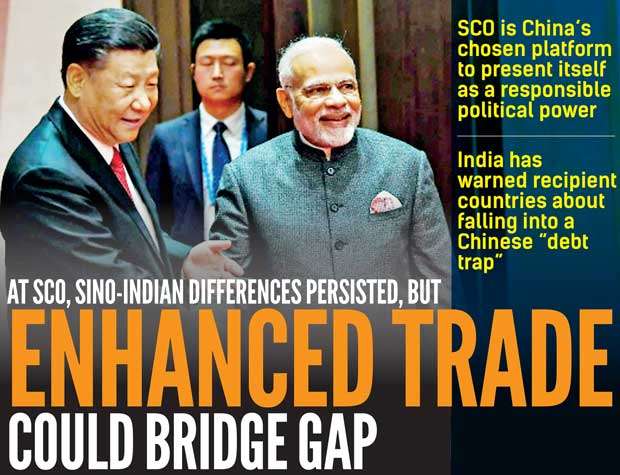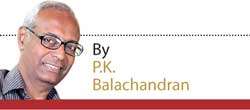Reply To:
Name - Reply Comment
Last Updated : 2024-04-20 11:47:00

 Even as the Qingdao Declaration was being drafted at the Shanghai Cooperation Organisation (SCO) summit, contradictions between India and China appeared, casting doubts about the success of the meeting held on June 9 and 10 at Qingdao in China.
Even as the Qingdao Declaration was being drafted at the Shanghai Cooperation Organisation (SCO) summit, contradictions between India and China appeared, casting doubts about the success of the meeting held on June 9 and 10 at Qingdao in China.
While all other six members of the SCO, viz. Russia, Pakistan, Kazakhstan, Kyrgyzstan, Tajikistan and Uzbekistan endorsed China’s ambitious multi-billion dollar Belt and Road Initiative (BRI) involving the construction of roads, railways, ports and other infrastructural facilities across Asia and Europe, India refused.
India said the BRI brazenly violates its sovereignty and territorial integrity because the US$ 62 billion China-funded China-Pakistan Economic Corridor (CPEC), which is part of the BRI, goes through Gilgit-Baltistan, a part of Kashmir which Pakistan holds but India claims.
 India looks at CPEC as a brazen violation of its sovereignty and territorial integrity. In his speech at the summit, where he delineated the principles on which the SCO should be based, Indian Prime Minister Narendra Modi said all SCO projects must respect members’ sovereignty and territorial integrity.
India looks at CPEC as a brazen violation of its sovereignty and territorial integrity. In his speech at the summit, where he delineated the principles on which the SCO should be based, Indian Prime Minister Narendra Modi said all SCO projects must respect members’ sovereignty and territorial integrity.
India’s objection puts China in a fix. The BRI and CPEC are ongoing multi-billion dollar projects from which China cannot conceivably withdraw. And if India does not endorse or cooperate with the BRI, the SCO will be that much less effective. And the SCO is China’s chosen platform to present itself as an effective and responsible Asian and world economic and political power in succession to the US and Japan.
India’s objection puts China in a fix. The BRI and CPEC are ongoing multi-billion dollar projects from which China cannot conceivably withdraw. And if India does not endorse or cooperate with the BRI, the SCO will be that much less effective
Ticklish Issues
With traditional enemies India and Pakistan now in the SCO, obtaining unanimity on decisions might be problematic. Bilateral issues could bedevil the organisation’s functioning. And with many unresolved issues still plaguing relations between China and India, getting the SCO to pull together might be a challenging task.
Considering Pakistan as its “all-weather friend,” China does not see Kashmir as being part of India de jure. China views Kashmir as a disputed territory whose formal status remains to be settled by India and Pakistan through negotiations. China also disputes Indian sovereignty over Arunachal Pradesh State in North Eastern India, saying Arunachal Pradesh is “Southern Tibet” and part of Tibet which is a region of China. To press home its point, China issues “stapled visas” and not regular visas to Indians from Kashmir and Arunachal Pradesh.
China has been blocking India’s bid in the United Nations to list Pakistan-based Zaki-ur-Rahman Lakhvi, Hafeez Saeed and Masood Azhar, as global terrorists. To India’s chagrin, China says that more evidence of their alleged involvement in deadly terror attacks in India is needed.
China has also consistently blocked India’s attempts to become a member of the Nuclear Suppliers’ Group (NSG), which regulates nuclear trade. China objects on the grounds that countries which have not signed the Nuclear Non-Proliferating Treaty (NPT) should not be admitted in the absence of a new consensus-based policy on admissions to the NSG.
Then, in the latter half of 2017, in continuance of the never-ending border dispute, China stepped on India’s toes by encroaching in the Doklam region of Bhutan, an Indian ally. Chinese forces occupied an area India sees as being vital for the security of its North Eastern region. The 72-day “standoff” at Doklam was resolved diplomatically, but it did bring the two Asian giants to the brink of war.
The other bee in the Indian bonnet is China’s economic “encroachment” in South Asia, which India considers to be its strategic and economic domain. China is not only executing the gigantic CPEC in Pakistan but is building multi-billion dollar mega infrastructural facilities in all the countries of South Asia, displacing India as the main development partner and aid giver.
India has warned the recipient countries about falling into a Chinese “debt trap” but the fund-starved South Asian countries, desperate to develop economically, have turned a deaf ear to India’s advice joined the BRI.
Sino-Indian bilateral trade, though large, is tilted heavily against India. There is now a US$ 36.73 billion trade gap between the two countries, with China not giving enough access to Indian goods. Indian manufacturers are also complaining of dumping by China, the latest complaint being from the solar power equipment sector.
On its part, India has been using “security concerns” to resist China’s efforts to invest in the country, especially in its infrastructure projects. There is also resistance to China’s efforts to penetrate the vast and growing Indian market through India’s Free Trade Agreements with other countries. China’s invitations to Indian companies to invest in BRI projects in the region are given the cold shoulder because such projects are seen as strategic penetration into India’s domain.
China has also consistently blocked India’s attempts to become a member of the Nuclear Suppliers’ Group (NSG), which regulates nuclear trade. China objects on the grounds that countries which have not signed the Nuclear Non-Proliferating Treaty (NPT) should not be admitted in the absence of a new consensus-based policy on admissions to the NSG
Signs of Accommodation
Nevertheless, Chinese President Xi Jinping has been making overtures to Indian Prime Minister Narendra Modi and the latter appears to be responding, albeit cautiously.
Xi has told Modi that Sino-Indian bilateral trade should go up from the current US$ 84 billion to US$ 100 billion by 2020. He has agreed to Modi’s proposal to import non-basmati rice. To help mitigate floods in North Eastern India, the Chinese leader has consented to supply hydrological data on the Brahmaputra river which flows from Tibet to India.
The Chinese side has told India that it would encourage Indian pharmaceutical companies to register for high-quality Indian pharmaceutical products in the Chinese market. In response to President Xi’s suggestion for enhancing financial cooperation between the two countries and also helping trade, Prime Minister Modi said India was ready to permit the Bank of China to establish its branch in Mumbai. More generally, China has been promising to address the issue of trade deficit.
US$ 4.7 billion Special Lending Facility
Irrespective of bilateral difficulties, the Chinese President is forging ahead with his plans to make SCO a major force in the world.
Significantly, Xi pledged a US$ 4.7 billion Special Lending Facility to the member States. He did say that member States must coordinate with China’s Belt and Road Initiative (BRI) for shared growth, but he qualified by adding that coordination must come through “discussion and collaboration.” Countries must also put themselves “in each other’s shoes” to get to know each other’s needs, Xi added.
China is eager to provide legal support for economic cooperation and trade, Xi announced and offered 3,000 training opportunities for member States. He placed at their disposal, meteorological data collected by the Chinese Febgyun-2 weather satellites.
Stressing cooperation with all, Xi stressed the importance of working with the UN, World Bank, IMF and other international financial institutions.
The Chinese President pleaded for people-people contact to strengthen multilateral ties by building personal trust. He envisaged people-to-people contacts in culture, education, media and other areas including disaster relief.
While opposing the BRI, Indian Prime Minister Modi said India was keen on cooperating with SCO countries in building connectivity in the region and pledged to make the SCO a success. This throws the door open to Sino-Indian cooperation in some areas at least.
Sino-Indian watchers believe that progress in trade and investment, even if only incremental, will enable India and China to move closer in other areas, albeit slowly and cautiously. They stress that it will be too much to expect a sea change in the troubled relationship any time soon. Domestic political and national security considerations, which shape a nation’s policies, take time to change.

Add comment
Comments will be edited (grammar, spelling and slang) and authorized at the discretion of Daily Mirror online. The website also has the right not to publish selected comments.
Reply To:
Name - Reply Comment
On March 26, a couple arriving from Thailand was arrested with 88 live animal
According to villagers from Naula-Moragolla out of 105 families 80 can afford
Is the situation in Sri Lanka so grim that locals harbour hope that they coul
A recent post on social media revealed that three purple-faced langurs near t